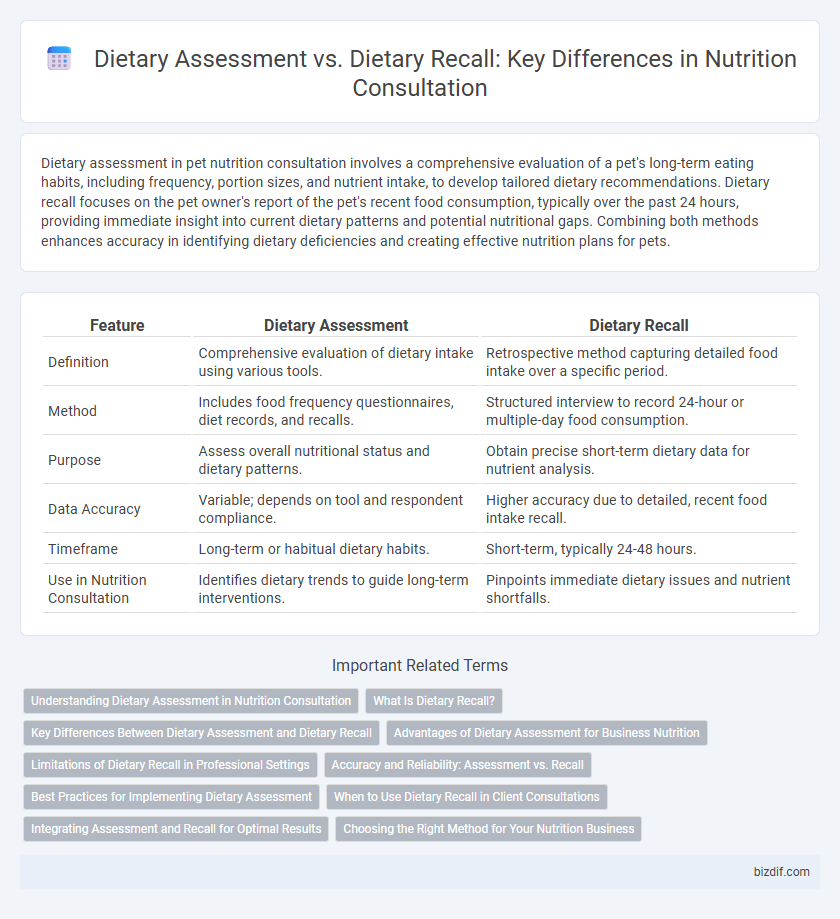Dietary assessment in pet nutrition consultation involves a comprehensive evaluation of a pet's long-term eating habits, including frequency, portion sizes, and nutrient intake, to develop tailored dietary recommendations. Dietary recall focuses on the pet owner's report of the pet's recent food consumption, typically over the past 24 hours, providing immediate insight into current dietary patterns and potential nutritional gaps. Combining both methods enhances accuracy in identifying dietary deficiencies and creating effective nutrition plans for pets.
Table of Comparison
| Feature | Dietary Assessment | Dietary Recall |
|---|---|---|
| Definition | Comprehensive evaluation of dietary intake using various tools. | Retrospective method capturing detailed food intake over a specific period. |
| Method | Includes food frequency questionnaires, diet records, and recalls. | Structured interview to record 24-hour or multiple-day food consumption. |
| Purpose | Assess overall nutritional status and dietary patterns. | Obtain precise short-term dietary data for nutrient analysis. |
| Data Accuracy | Variable; depends on tool and respondent compliance. | Higher accuracy due to detailed, recent food intake recall. |
| Timeframe | Long-term or habitual dietary habits. | Short-term, typically 24-48 hours. |
| Use in Nutrition Consultation | Identifies dietary trends to guide long-term interventions. | Pinpoints immediate dietary issues and nutrient shortfalls. |
Understanding Dietary Assessment in Nutrition Consultation
Dietary assessment in nutrition consultation involves a comprehensive evaluation of an individual's usual food intake and nutrient consumption patterns over time. Unlike dietary recall, which captures short-term eating habits within a specific period, dietary assessment combines multiple methods including food frequency questionnaires, dietary records, and recall to provide a more accurate representation of long-term dietary behaviors. This approach enables nutrition professionals to identify nutrient deficiencies, inform personalized dietary plans, and monitor progress effectively.
What Is Dietary Recall?
Dietary recall is a method used in nutrition consultation where individuals report all foods and beverages consumed within a specific period, typically the previous 24 hours. This technique captures detailed information on portion sizes, meal timing, and preparation methods, enabling accurate nutrient intake analysis. Compared to dietary assessment, dietary recall relies on memory, making precise interviewer techniques essential to minimize reporting biases and enhance data reliability.
Key Differences Between Dietary Assessment and Dietary Recall
Dietary assessment methods evaluate an individual's overall nutritional intake using tools like food frequency questionnaires, whereas dietary recall specifically gathers detailed information about all foods and beverages consumed in the previous 24 hours. Dietary recall relies on the participant's memory and is typically conducted through interview or self-report, providing precise intake data for a specific day. Dietary assessment offers a broader understanding of habitual diet patterns, while dietary recall focuses on detailed short-term consumption.
Advantages of Dietary Assessment for Business Nutrition
Dietary assessment provides comprehensive, objective data on clients' nutritional intake, allowing businesses to tailor personalized nutrition plans with higher accuracy. Unlike dietary recall, which relies on clients' memory and can introduce bias, dietary assessment methods use measurable metrics to improve the precision of dietary recommendations. This enhanced accuracy supports better client outcomes, driving customer satisfaction and business growth in nutrition services.
Limitations of Dietary Recall in Professional Settings
Dietary recall relies on an individual's memory to report food intake, often leading to inaccuracies due to recall bias and underreporting of portion sizes. This method may not capture habitual dietary patterns, limiting its effectiveness in professional nutrition assessments. In contrast, dietary assessment tools like food frequency questionnaires or food diaries provide more comprehensive and reliable data for clinical decision-making.
Accuracy and Reliability: Assessment vs. Recall
Dietary assessment methods provide more comprehensive and standardized data by evaluating habitual food intake over a specific period, enhancing accuracy in nutritional analysis. Dietary recall relies on an individual's memory of recent consumption, which can introduce errors and reduce reliability due to recall bias. Nutrition consultations benefit from combining both approaches to improve the precision of dietary evaluations and personalized recommendations.
Best Practices for Implementing Dietary Assessment
Dietary assessment methods, including dietary recall and food frequency questionnaires, provide essential data for personalized nutrition consultations by accurately capturing nutrient intake and meal patterns. Best practices for implementing dietary assessments emphasize standardized protocols, multiple recall days, and trained interviewers to minimize recall bias and improve data reliability. Integrating technology such as mobile food diaries and automated nutrient analysis enhances precision and facilitates real-time dietary monitoring in clinical settings.
When to Use Dietary Recall in Client Consultations
Dietary recall is most effective in client consultations when immediate, detailed intake information is needed to assess recent eating habits and identify nutritional gaps. It is particularly useful for clients with memory recall capabilities and when capturing day-to-day dietary variations is essential. This method supports personalized nutrition plans by providing accurate data on portion sizes and meal timing during short-term diet evaluations.
Integrating Assessment and Recall for Optimal Results
Dietary assessment and dietary recall are complementary tools that, when integrated, provide a comprehensive understanding of an individual's nutritional intake. Combining these methods enhances accuracy by offsetting the limitations of each approach; dietary assessment offers detailed quantitative data, while dietary recall captures qualitative context and recent consumption patterns. Implementing an integrated strategy improves personalized nutrition plans, supporting optimal health outcomes through more precise dietary analysis.
Choosing the Right Method for Your Nutrition Business
Dietary assessment provides a comprehensive analysis of habitual eating patterns over time, making it ideal for long-term nutrition planning in your business. Dietary recall captures detailed information about recent food intake, offering quick insights but with potential memory bias. Selecting the appropriate method depends on your nutrition business goals, target audience, and need for accuracy versus feasibility.
Dietary Assessment vs Dietary Recall Infographic

 bizdif.com
bizdif.com